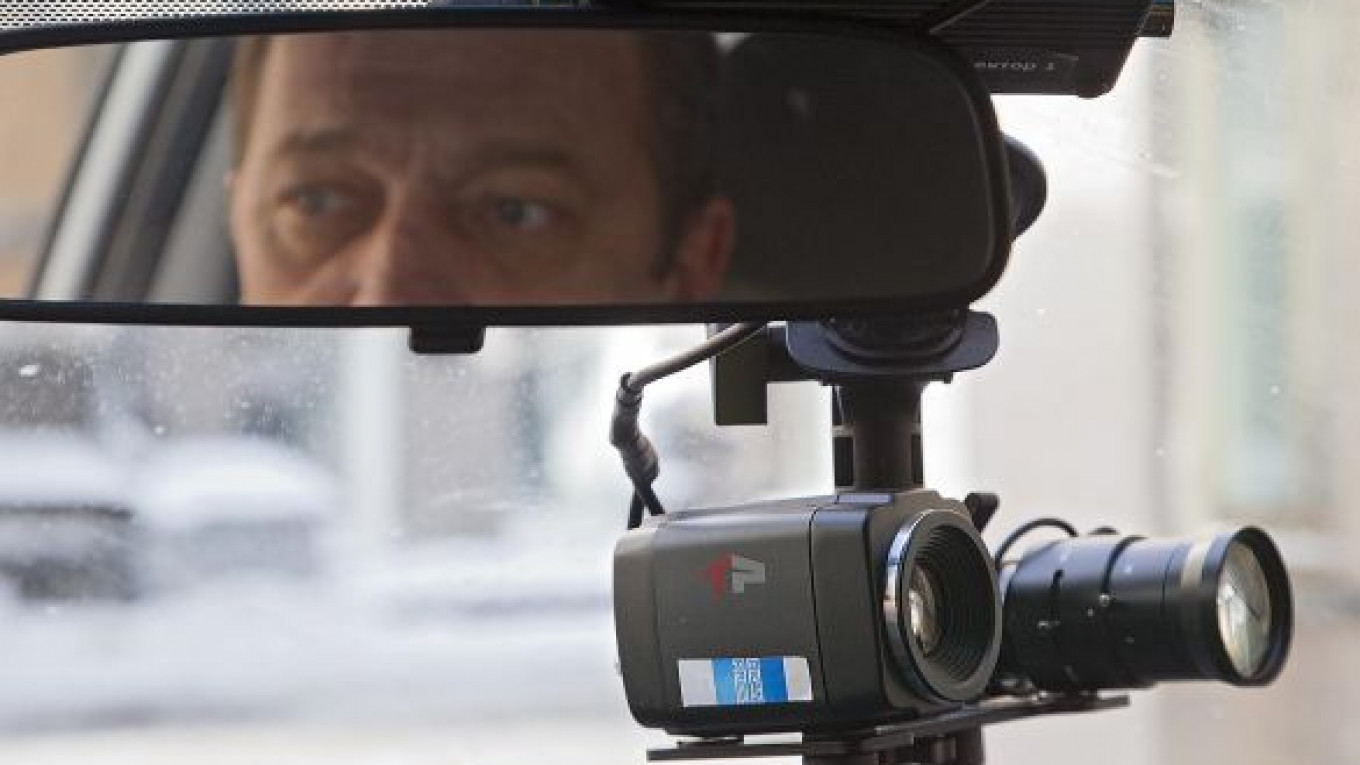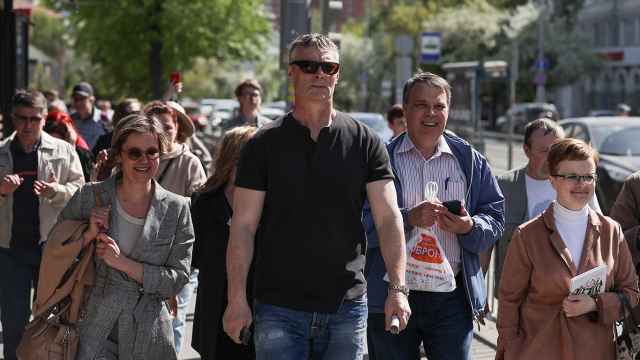When it comes to parking, Moscow has long been gripped by anarchy. Anybody who has walked the city will confirm that drivers habitually park their cars anywhere they find space: on sidewalks, in entryways and even in the second and third lanes of busy thoroughfares.
But over the past months, a small revolution has been brewing. In a double-pronged move, City Hall upped the fine for illegal parking tenfold to 3,000 rubles ($100) last summer and acquired a fleet of more than a hundred cars that roam the city with dashboard cameras recording illegally parked vehicles.
The surveillance cars collect parked vehicles' license plate numbers and locations via satellite positioning, while circling along some 200 routes. They can operate at a speed of 40 kilometers per hour, meaning they need not slow down for violators.
The data is processed automatically, supervised by civilian staff from the city's transportation department. There is no personal contact between violators and traffic police, who have a notoriety for corruption. The police then send out parking tickets, called "lucky letters" in Russian, to vehicle owners via registered mail.
Dubbed "Parkon" in Russian, the system is not known to have been adopted in any other country in the world, said its inventor, Ilya Barsky.
Barsky, the CEO of Simicon, a St. Petersburg-based firm that specializes in speed cameras and other traffic police equipment, came up with the idea in 2010, when he was approached by the chief of Kazan's traffic police. His system was subsequently installed in the Tatar capital.
Moscow followed suit last April, and Barsky's firm has meanwhile sold Parkon to local authorities as far afield as Vladivostok, Tula and Ivanovo.
Barsky argues that his system correctly tackles the unique nature of the country's parking problem: "The dimension is so big that we won't succeed even with an army of [parking] inspectors like in the West," he said by telephone from St. Petersburg.
He explained that only a fully automated system was up to the task.
But critics say the system is unfair, riddled with loopholes and, in principal, illegal. Worse, they claim that payment levels are dismal and that City Hall will be forced to rethink its strategy.
Unsurprisingly, the system has led to a flood of fines. Between July 1 and Dec. 1, the city sent out 108,212 of the 3,000 ruble fines, worth a staggering 324.6 million rubles ($10.5 million), according to a reply by city traffic police to questions from bloggers Denis Ternovsky and Alexander Shumsky, in December.
A City Hall tender for posting traffic fines said in July that authorities expected to send out 21.9 million letters . However, it was not immediately clear how many of the tickets had been paid.
In their answer to the bloggers, traffic police only said that about 60 percent of all 4 million fines in that period — including tickets for speeding and driving in bus lanes and totaling 3 billion rubles ($97 million) — were being paid.
City traffic police did not respond to written questions sent by fax Wednesday.
Pyotr Shkumatov, coordinator of the Blue Buckets, a motorist rights organization, argued that payment levels for the parking tickets were as low as 20 percent. "By our estimates, only one in five drivers pays," he said, adding that, in contrast, four out of five pay speeding tickets. "You know when you were going to fast. But the parking system is different," he said.
By law, traffic fine payment can be enforced by court marshals, who have the right to seize assets. However, Shkumatov said, enforcement is mostly left to border guards, who bar citizens from leaving the country when a warning pops up on their screen.
The court marshals' website on Friday listed 1,588 persons and organizations being sought for enforcement in Moscow.
Activists point out that many people are unaware of parking restrictions, even in their own neighborhood. "Punishment needs to be just. But here the majority of people get the impression that they're being robbed," Shkumatov said.
Moscow tends to have fewer traffic signs than European and U.S. cities. Parking restrictions are usually indicated by a single sign at the very beginning of a street, which is repeated only after the next crossroads. Colored indications on the asphalt, like in Britain, are a rarity.
Most residents have stopped caring about legal parking because City Hall has long ignored enforcing the rules. The main reason was that at 300 rubles ($10), fines offered no incentive for enforcement. Vasily Kichedzhi, a transportation chief under former Mayor Yury Luzhkov, even proudly pronounced in 2010 that Moscow was the world's only capital with free parking.
Mayor Sergei Sobyanin, who promised to solve the city's traffic woes when he succeeded Luzhkov in 2010, last year introduced the city's first residents-only parking zone.
He admitted that the new fines would not be popular but argued that drivers would not give up their habits of parking where they want when they can do so with impunity.
"I am convinced that the majority of Muscovites support them because the necessity to bring order to the streets has become obvious to everybody in our city," he the City Duma in October.
Sobyanin also denies that the fines are meant to improve the city budget.
The city plans to widen the Parkon program. The current fleet of 110 cars is set to rise to between 300 and 400, according to the transportation .
Shkumatov said that according to his information, their number could rise to 1,000 vehicles.
City Hall has also announced that cameras would be installed on busses and road maintenance vehicles such as snowploughs, which roam neighborhoods at night.
Meanwhile, drivers are not necessarily changing their habits. Some are covering parts of their license plates with dirt, snow, even paper. This, however, is not a good idea, as drivers risk an extra 5,000 ruble fine, according to a law specially passed together with the higher fines by the City Duma last summer.
Shkumatov said that drivers better take off license plates altogether — which, unlike covering them, is not illegal as long as the car is parked.
Another trick is to deregister your car and get so-called transit license plates with a small yellow field on the right. Deregistered vehicles' owners cannot be found, but the transit plates expire after 20 days. However, traffic police rarely bother to enforce that rule for the fine because driving with expired plates is just 300 rubles, Shkumatov explained.
He also said motorists were fined illegally for multiple sightings. The city's transportation department has said owners would only be fined once a day, and when a car has been caught by the camera at least twice, with the interval between the first and the last recording indicated on the fine.
But Shkumatov said cars would be fined if they were found on the same spot on another day — which is illegal.
The activist also argued that the whole system was illegal because it had not been included on the list of approved devices for the traffic police. He said this had not yet been challenged in court because of the cumbersome judicial bureaucracy. "You need to go through five circles of hell" to do that, he said.
However, Barsky, the inventor, denied that. He said the traffic police list was only for measuring devices like breathalyzers and speed cameras. "Parkon does not measure anything. It only records data," he said.
Contact the author at n.twickel@imedia.ru
A Message from The Moscow Times:
Dear readers,
We are facing unprecedented challenges. Russia's Prosecutor General's Office has designated The Moscow Times as an "undesirable" organization, criminalizing our work and putting our staff at risk of prosecution. This follows our earlier unjust labeling as a "foreign agent."
These actions are direct attempts to silence independent journalism in Russia. The authorities claim our work "discredits the decisions of the Russian leadership." We see things differently: we strive to provide accurate, unbiased reporting on Russia.
We, the journalists of The Moscow Times, refuse to be silenced. But to continue our work, we need your help.
Your support, no matter how small, makes a world of difference. If you can, please support us monthly starting from just $2. It's quick to set up, and every contribution makes a significant impact.
By supporting The Moscow Times, you're defending open, independent journalism in the face of repression. Thank you for standing with us.
Remind me later.







